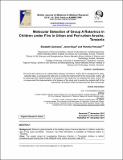| dc.description.abstract | age of five years worldwide. However, very little information is available on Rotavirus status in
Tanzania.
Aims: The project aimed at investigating Rotavirus infection in Tanzanian children to reflect
prevalence post introduction of the Rotarix® virus, which occurred in late 2012.
Methods: The study considered prevalence in an urban and peri-urban context in Arusha, Tanzania
for children under five. The study involved molecular detection of rotavirus in stool samples using
PCR targeting Group A Rotavirus as well as a questionnaire to determine possible contributing
factors, such as vaccination status, age, and exclusive breastfeeding to infection.
Results: Out of a total of 100 stool samples collected, 37% were positive for Rotavirus. The
Fisher’s Exact Test was used to relate conventional PCR test results and various factors associated
with Rotavirus positive samples. Household practices of boiling water, as well as
parents’/guardians’ knowledge on the Rotavirus vaccine and child vaccination status were
significantly (p<0.05) associated with Rotavirus infection.
Conclusion: The findings of this study should inform further studies to address the molecular
epidemiology of the disease and associated risk factors. In this study we undertook surveillance for
molecular detection and characterization of Rotavirus while considering the impact of prevention
and control measures, such as vaccinations and uptake of safe practices (i.e., boiling water) on
prevalence. | en_US |

